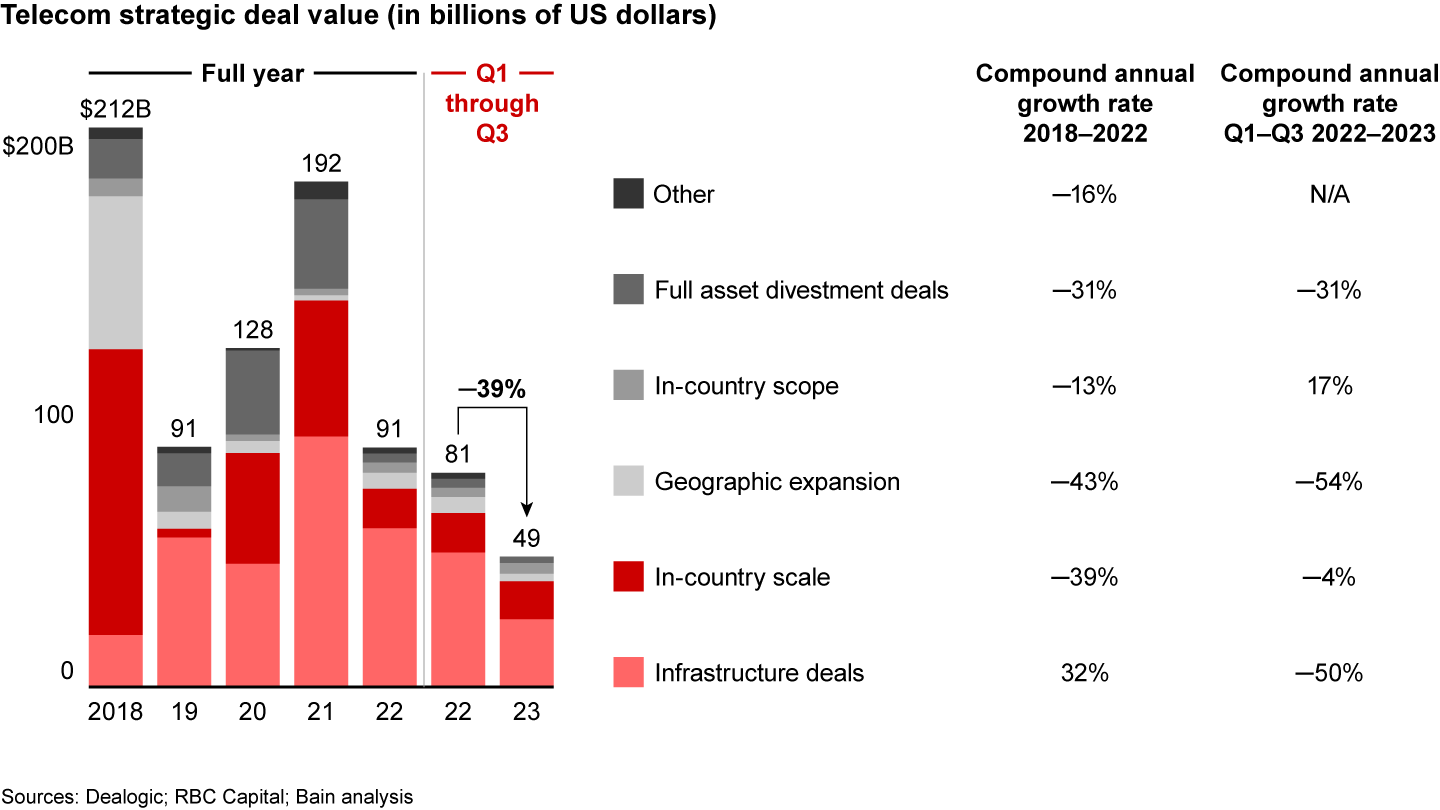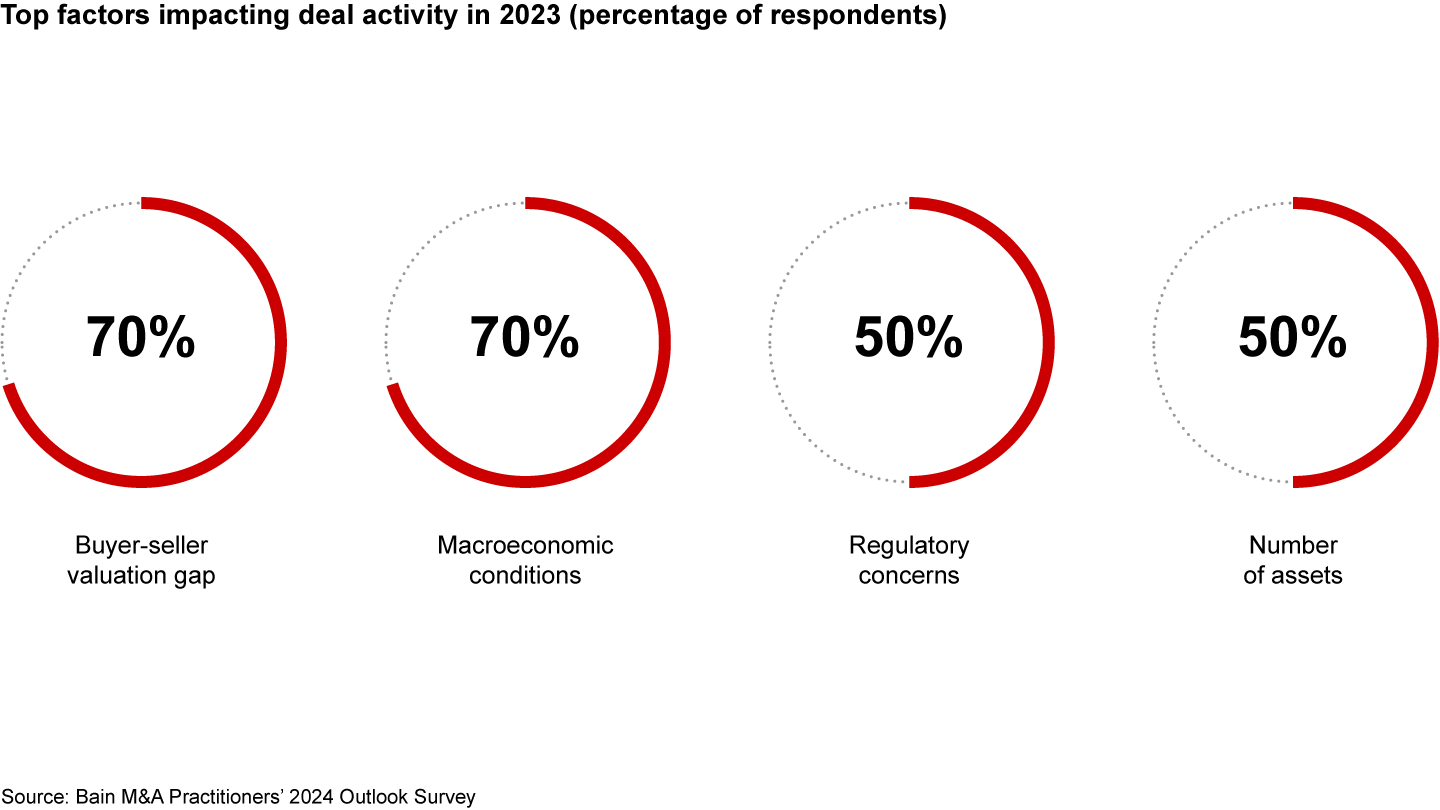M&A Report
 }
}
At a Glance
- Telecom M&A deal value declined by 39% during the first three quarters of 2023, for the second consecutive down year.
- More than 80% of deal value involved either in-country consolidations or infrastructure deals.
- We expect 2024 deal activity to be concentrated in specific subsectors, including fiber networks, enterprise services, and data centers.
- Regulatory scrutiny of telecom dealmaking remains uncertain, although some executives perceive it as easing somewhat.
This article is part of Bain's 2024 M&A Report.
The story of telecommunications mergers and acquisitions in 2023 was defined more by the deals that didn’t happen than the ones that did. The industry’s deal value declined by about 39% during the first three quarters of last year, the second consecutive down year after strong growth in 2021.
Much of the newsworthy activity took place in Europe. Slicing the data by deal types, in-country scale deals and infrastructure divestments continued to account for a majority of the value (see Figure 1).

Look below the surface, and those two categories had mixed performances.
Scale deal value was flat
Telecom dealmaking remains a scale game. Macroeconomic challenges (including high interest rates) and significant capital spending across the industry create incentives for some telcos (particularly smaller or highly leveraged ones) to consolidate in order to gain scale and bolster resources. Indeed, scale deals were quite resilient amid the industry’s M&A decline last year. Scale M&A value was essentially flat, down just 4% year over year in the first three quarters of 2023.
The year’s biggest announced deal was a scale transaction: Vodafone and Hutchison Group, owner of Three, agreed to merge to form the UK’s largest mobile network operator, with a combined enterprise value of about $19 billion. Currently running the UK’s third- and fourth-largest mobile networks, respectively, Vodafone and Three are positioning the deal as a combination of two subscale operators to create a stronger market challenger with more investment resources. Regulators blocked a union of two of the UK’s largest mobile players in 2016, but Vodafone and Three’s leaders hope that their deal might go through.
The valuation gap effect
In addition to macroeconomic and regulatory headwinds, mismatched valuation expectations often kept buyers and sellers from closing telecom deals in 2023, according to Bain’s survey of more than 300 M&A practitioners across industries (see Figure 2).

Look at the effect on infrastructure deals. While transaction multiples held steady at about 25 times throughout the first three quarters of 2023, infrastructure assets’ trading multiples dropped to 14.7 times, the lowest in five years. So, even though infrastructure deals once again accounted for more than half of total telecom deal value through the third quarter, the category’s value was down about 50% year over year.
Pockets of opportunity
The environment for M&A will likely remain challenging for the foreseeable future. High interest rates are pressuring many telcos to consolidate or carve out assets while adapting their M&A approach: 60% of surveyed telcos are getting more selective in the deals they pursue.
This still creates pockets of opportunity for those selective bets. Here are three areas to watch in 2024.
Fiber network consolidation is coming. When interest rates were low, many fiber companies built out networks financed by debt in places such as the UK and Germany. Pressure to make a deal could grow if they don’t succeed in attracting enough customers to deliver a return on investment. (For more, read the Bain Brief “Telco Fiber Networks: If You Build It, Will They Come?”) In addition, many countries’ fiber networks have matured enough that companies’ method of value creation will shift from planting their flag and building the fiber infrastructure themselves to tapping into scale effects via consolidation. Brazil and the US are some of the largest markets where such a consolidation stage is most likely to occur.
Higher-growth segments will attract deals. We expect robust activity in enterprise services, a high-growth market undergoing significant technology shifts (e.g., copper to fiber, 4G to 5G, and on-premise data storage to public cloud). For telcos that have a small enterprise business or none at all, it could be a good time to make targeted acquisitions to add capabilities or gain scale. Enterprise services deals in 2023 included Proximus, a Belgium-based provider of digital communications and identity services, buying a majority stake in India-based Route Mobile for more than $700 million.
Other attractive segments include data centers as demand for data continues to surge amid advances in artificial intelligence, the Internet of Things, and other technologies. That can create opportunities for telcos looking to carve out data center assets to shore up their cash positions. Private equity firms will be the most likely suitors as evidenced by several of 2023’s biggest data center acquisitions—for example, Brookfield’s purchases of US-based Compass Datacenters for a reported $5.7 billion and France-based Data4 for a reported $3.8 billion, as well as EQT and PSP’s $3 billion joint acquisition of US-based Radius. On the flip side, data centers could be a source of growth for incumbent telcos in countries where governments are seeking nationally sovereign clouds to address data security concerns. Look for telcos to continue owning and potentially expanding their data center holdings in these markets.
Industry dynamics might make regulators open to more consolidation. As telcos continue to invest heavily in fiber network expansion, mobile network density, and whatever succeeds 5G, scale deals could provide cash infusions. That’s especially crucial as connectivity services become more commoditized, making price increases less palatable. At the same time, geopolitical uncertainty has made communications network resiliency a more critical priority for governments around the world, potentially shifting regulators’ calculus in favor of consolidation. Yet, telcos will likely still need to take steps to allay competition and price concerns, such as by opening their networks to wholesale agreements.
For their part, telecommunications executives perceive regulatory scrutiny easing somewhat. In Bain’s recent M&A survey, telecommunications was one of only two sectors in which executives saw less regulatory scrutiny than they did two years ago, although it remains a concern for many.
Add it all up, and about 30% of telcos surveyed by Bain expect to do fewer deals in 2024 than in 2023, one of the least optimistic industry outlooks in our survey. The buyer-seller valuation gap and the cost of debt are among the most important factors that will determine M&A activity in telecommunications, according to the survey. Meanwhile, some economic forecasters project easing inflation and stronger-than-expected economic growth in 2024.
Those dynamics remain outside of telecommunications executives’ control, of course, but that doesn’t mean they should sit on the M&A sidelines, waiting for conditions to improve. Winners in this market will gain an edge by proactively scanning and acting quickly when the right deal openings appear. They’ll also prepare now so that they’re ready to seize the moment when macroeconomic conditions do improve.
In this environment, the fundamentals become even more crucial. Leading telcos will reinforce their core businesses by shedding assets that don’t fit long-term growth plans, perhaps selling to unconventional buyers such as private equity. As more telcos come under financial pressure, it will create opportunities for competitors to increase scale in their core businesses and make moves in adjacent products and services, especially in fiber and enterprise technology services. Some of these investments might feel uncomfortable right now. Yet even as telcos get more selective in their bets, the most successful ones will stay bold.

